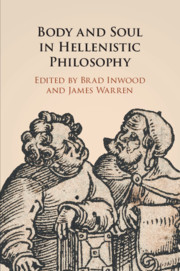Book contents
- Body and Soul in Hellenistic Philosophy
- Body and Soul in Hellenistic Philosophy
- Copyright page
- Contents
- Contributors
- Abbreviations
- Introduction
- Chapter 1 Hellenistic Medicine, Strato of Lampsacus, and Aristotle’s Theory of Soul
- Chapter 2 Herophilus and Erasistratus on the Hēgemonikon
- Chapter 3 Galen on Soul, Mixture and Pneuma
- Chapter 4 The Partition of the Soul
- Chapter 5 Cosmic and Individual Soul in Early Stoicism
- Chapter 6 Soul, Pneuma, and Blood: The Stoic Conception of the Soul
- Chapter 7 The Platonic Soul, from the Early Academy to the First Century ce
- Chapter 8 Cicero on the Soul’s Sensation of Itself: Tusculans 1.49–76
- Bibliography
- Index Locorum
- Subject Index
Chapter 1 - Hellenistic Medicine, Strato of Lampsacus, and Aristotle’s Theory of Soul
Published online by Cambridge University Press: 20 May 2020
- Body and Soul in Hellenistic Philosophy
- Body and Soul in Hellenistic Philosophy
- Copyright page
- Contents
- Contributors
- Abbreviations
- Introduction
- Chapter 1 Hellenistic Medicine, Strato of Lampsacus, and Aristotle’s Theory of Soul
- Chapter 2 Herophilus and Erasistratus on the Hēgemonikon
- Chapter 3 Galen on Soul, Mixture and Pneuma
- Chapter 4 The Partition of the Soul
- Chapter 5 Cosmic and Individual Soul in Early Stoicism
- Chapter 6 Soul, Pneuma, and Blood: The Stoic Conception of the Soul
- Chapter 7 The Platonic Soul, from the Early Academy to the First Century ce
- Chapter 8 Cicero on the Soul’s Sensation of Itself: Tusculans 1.49–76
- Bibliography
- Index Locorum
- Subject Index
Summary
Although Aristotle’s thought became a byword in the early modern period for a rigid and inflexible system impervious to empirical evidence, it seems to have been quite otherwise in the practice of Aristotle’s own school. In reconstructing the psychological theory of the third head of the Lyceum, Strato of Lampsacus, I argue that we can best understand his departures from Aristotelian doctrine by looking to new medical theories in the Hellenistic period, which had implications for our philosophical understanding of the soul’s functioning. Aristotle, who was interested in the natural processes underlying even the most abstract aspects of human functioning, had lampooned the notion that the soul might exist apart from the body: his psychology posited an intimate connection between form and function, and was informed by empirical studies of living organisms. Strato was known even in antiquity both for a revisionist attitude and his focus on natural philosophy. It would thus be unsurprising for him to be interested in new medical research.
- Type
- Chapter
- Information
- Body and Soul in Hellenistic Philosophy , pp. 9 - 29Publisher: Cambridge University PressPrint publication year: 2020
- 5
- Cited by

